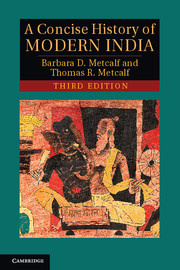Book contents
- Frontmatter
- Contents
- Illustrations
- Preface to the third edition
- Preface to the first edition
- Glossary
- Chronology
- 1 Sultans, Mughals, and Pre-Colonial Indian Society
- 2 Mughal Twilight: The Emergence of Regional States and the East India Company
- 3 The East India Company Raj, 1772–1850
- 4 Revolt, the Modern State, and Colonized Subjects, 1848–1885
- 5 Civil Society, Colonial Constraints, 1885–1919
- 6 The Crisis of the Colonial Order, 1919–1939
- 7 The 1940s: Triumph and Tragedy
- 8 Congress Raj: Democracy and Development, 1950–1989
- 9 Democratic India at the Turn of the Millennium: Prosperity, Poverty, Power
- Biographical notes
- Bibliographic essay
- Index
2 - Mughal Twilight: The Emergence of Regional States and the East India Company
Published online by Cambridge University Press: 05 November 2012
- Frontmatter
- Contents
- Illustrations
- Preface to the third edition
- Preface to the first edition
- Glossary
- Chronology
- 1 Sultans, Mughals, and Pre-Colonial Indian Society
- 2 Mughal Twilight: The Emergence of Regional States and the East India Company
- 3 The East India Company Raj, 1772–1850
- 4 Revolt, the Modern State, and Colonized Subjects, 1848–1885
- 5 Civil Society, Colonial Constraints, 1885–1919
- 6 The Crisis of the Colonial Order, 1919–1939
- 7 The 1940s: Triumph and Tragedy
- 8 Congress Raj: Democracy and Development, 1950–1989
- 9 Democratic India at the Turn of the Millennium: Prosperity, Poverty, Power
- Biographical notes
- Bibliographic essay
- Index
Summary
Our time traveller in 1707, especially if he had been misled by European accounts of ‘Oriental despots’, may well have failed to appreciate the extent to which the Mughal Empire, like other pre-modern political systems of that scale, operated by a hierarchic distribution of authority among different levels of society. There was no monopoly of military force; there was no monopoly of political authority. The Mughal himself was shahinshah, ‘king of kings’, hence one sovereign among many. Competition to expand geographically was always endemic, as was competition between the vertical levels of the system. It is conflict, as Bernard Cohn has written using the late Mughal period as an example of such systems, that achieves the precarious consensus and balance that allows such political systems to persist. Effective rule required not only resolving competition but also judgment about the conflicts with which to engage. During the first half of the eighteenth century Mughal power contracted, while those who had once been subordinate to the Mughals flourished. Among the new regional powers was a joint stock company of English traders, which, by century's end, was poised to claim the mantle of the Mughals as ruler of the subcontinent.
The ‘Fault Lines’ of Mughal Control
A cogent perspective on Aurangzeb as ruler comes from one Bhimsen, a Hindu Kayastha memoirist, who, in his final decades of service, acted as auditor and inspector for a Rajput noble. Writing at the end of Aurangzeb's life, Bhimsen gives us a ‘grass roots’ view of what he sees as imperial failure. He was, as John Richards has written, one of many who claimed generations of loyalty to the Mughal regime, men who prided themselves on their devotion and courage as well as their mastery of Indo-Persian courtly culture. As Bhimsen followed his master into the futile battles against the rebellious zamindars and chiefs, he despaired of the difference between earlier Mughal rule and that of the later Aurangzeb:
When the aim of the ruling sovereign is the happiness of the people, the country prospers, the peasants are at ease, and people live in peace. The fear of the king's order seizes the hearts of high and low. Now that the last age [kaliyuga] has come, nobody has an honest desire; the Emperor, seized with a passion for capturing forts, has given up attending to the happiness of the subjects. The nobles have turned aside from giving good counsel.
- Type
- Chapter
- Information
- A Concise History of Modern India , pp. 29 - 55Publisher: Cambridge University PressPrint publication year: 2012



